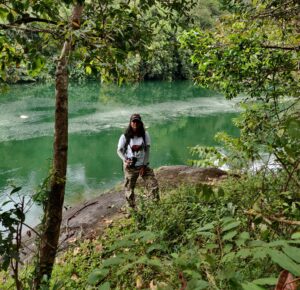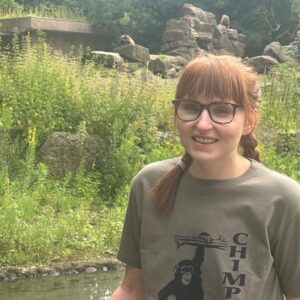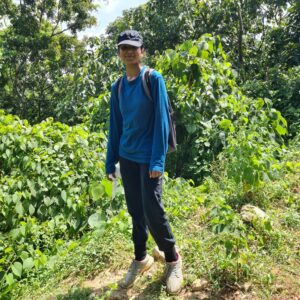Primate Behavioural Ecology Laboratory
Team
Prof. UAM dr hab. Małgorzata Arlet
I am a biologist with a passion for studying social behavior from an ecological and evolutionary perspective. I am interested in learning the mechanisms of social relationships in animals. My main research subject was gray mangabeys in a tropical forest in Uganda (1999-2014), the arboreal cousins of baboons. I conducted research on female reproductive strategies, stress, testosterone, parasites, female reproductive success and offspring care. I also observed other species of monkeys (free-living and in the zoo), lowland gorillas and dolphins. I also studied communication in Japanese macaques and Campbell monkeys. Since 2016, I have been conducting research on the behavior of bonnet macaques in Thenmala, southern India, first in cooperation with the University of California at Davis, and since 2019 as part of my own Harmonia grant (2018/30/M/NZ8/00025), as the Thenmala Macaque Project. I conduct research on offspring care, personality development in macaques, as well as social strategies in males.
Research interests
Social behavior in primates / Evolution of social strategies / Species conservation / Consciousness and language / Nature education
Collaborations
University of California Davis (USA), McGill University Montreal (Canada), University of Rennes 1 (France), Tartu University (Estonia), Indian Institute of Science Education Research Trivandrum (India), Makerere University in Kampala (Uganda)
Link to the project: The Thenmala Macaque Project
Instagram: The Thenmala Macaque Project
Grants
2024
- Title: Friend or Enemy? Navigating social relationships in male bonnet macaques in India.
- Principal investigator: mgr Ashvita Anand
- Research supervisor: prof. UAM. Małgorzata Arlet
- Call: PRELUDIUM, Narodowe Centrum Nauki
- Project: 2023/49/N/NZ8/01434
- Implementation period: 2024-2026
- Granted funds: 210 000 PLN
2019
- Title: Wpływ osobowości matki i matczynej opieki na rozwój osobowości dziecka w pierwszym roku życia u wolnożyjących makaków czepkowych w południowych Indiach.
- Principal investigator: prof. UAM dr hab. Malgorzata Arlet
- Call: HARMONIA 10, Narodowe Centrum Nauki
- Project: 2018/30/M/NZ8/00025
- Implementation period: 2019-2023
- Granted funds: 547 820 PLN
- Project description: NCN
Publications
Arlet ME, Anand A, Saikia A, Kaasik A, Sirigeri S, Isbell LA, Singh M. 2023. Behavior of Mothers after Infant Loss in Bonnet Macaques (Macaca radiata). International Journal of Primatology, 1-18.
AnandA, Balakrishna N, Singh M, Isbell LA, Sirigeri S, Saikia A, Arlet ME. 2022. Infant adoptions in wild bonnet macaques (Macaca radiata). Primates 63, 627-635
Balasubramaniam KN, Aiempichitkijkarn N, Kaburu SS, Marty PR, Beisner BA, Bliss-Moreau E, Arlet ME, Atwill E, McCowan B. 2022. Impact of joint interactions with humans and social interactions with conspecifics on the risk of zooanthroponotic outbreaks among wildlife populations. Scientific reports 12, 1-13.
Balasubramaniam K, Kaburu, S, Marty P, Beisner B, Bliss-Moreau E, Arlet ME, Ruppert N, Ismail A, Anuar Mohd Sah S, Mohan L, Rattan S, Kodandaramaiah U, McCowan B. 2021. Implementing social network analysis to understand the socio-ecology of wildlife co-occurrence and joint interactions with humans in anthropogenic environments. Journal of Animal Ecology 90, 2819-2833.
Arlet ME, Balasubramaniam KN, SahaR, Beisner B, Marty PR, Kaburu SSK, Bliss-MoreauE, Kaasik A, Kodandaramaiah U,McCowan B. 2021.Infant survival among free-living bonnet macaques (Macaca radiata) in South India. International Journal of Primatology 42, 220-236.
Balasubramaniam KN, Marty PR, Samartino S, Sobrino A, Saha R, Gill T, Ismail M, Beisner BA, Kaburu SSK, Bliss-Moreau E, Arlet ME, Ruppert N, Ismail A, Sah SAM, Mohan L, Rattan S, Kodandaramaiah U, McCowan B. 2020. Impact of individual demographic and social factors on human-wildlife interactions: a comparative study of three macaque species. Scientific Reports 10, 1-16
Balasubramaniam KN, Marty PR, Arlet ME, Beisner BA, Kaburu SSK, Bliss-Moreau E, Kodandaramaiah U, McCowan B. 2020. Impact of anthropogenic factors on affiliative behaviors among bonnet macaques. American Journal of Physical Anthropology 174, 704-717.
Marty PR, Balasubramaniam KN, Kaburu SSK, Hubbard J, Beisner B, Bliss-Moreau E, Ruppert N, Arlet ME, Sah SAM, Ismail A, Mohan L, Rattan SK, Kodandaramaiah U, McCowan B. 2020. Individuals in urban dwelling primate species face unequal benefits associated with living in an anthropogenic environment. Primates 61, 249-255
Kaburu, S. S., Beisner, B., Balasubramaniam, K. N., Marty, P. R., Bliss-Moreauc, E., Mohane, L., Arlet ME & McCowan, B. (2019). Interactions with humans reduce resting and grooming time in commensal rhesus macaques (Macaca mulatta). Folia Primatol, 91, 240-363.
Marty P, Beisner B, Kaburu SSK, Balasubramaniam K, Bliss-Moreau E, Ruppert N, Sah S, Ahmad I, Arlet ME, Atwill ER, McCowan B. 2019. Time constraints and stress imposed by human presence alter social behaviour in urban long-tailed macaques. Animal Behavior 150, 157-165.
Kaburu SS, Beisner B, Balasubramaniam KN, Marty PR, Bliss-Moreau E, Mohan L, Arlet ME, Atwill ER, McCowan B. 2019. Interactions with humans impose time constraints on urban-dwelling rhesus macaques (Macaca mulatta). Behaviour 156, 1255-1282
Arlet ME, Veromann-Jürgenson LL, Isbell LA, Mänd R, Lemasson A. 2019. Maternal care in free-ranging arboreal grey-cheeked mangabeys (Lophocebus albigena johnstoni) in Kibale National Park, Uganda. Folia Primatologica 90, 441–455.
Coye C, Ouattama K, Arlet ME, Lemasson A, Zuberbűhler K. 2018. Flexible use of simple and combined calls in female Campbell’s monkeys. Animal Behavior 141, 171-18.
Arlet ME, Veromann LL, Mänd R, Lemasson A. 2016. Call rates of mothers change with social experience and with infant characteristics in free-ranging gray-cheeked mangabeys. Am J Primatol, 78, 983-991.
Lemasson A, Jubin R, Masataka N, Arlet ME. 2016. Copying hierarchical leaders’ voices : acoustic plasticity in female Japanese macaques. Scientific Reports 6, 21289.
Arlet ME, Jubin R, Masataka N, Lemasson A. 2015. Grooming-at-a-distance by exchanging calls in nonhuman primates. Biology Letters 11, 20150711.
Arlet ME, Chapman CA, Isbell LA, Molleman F, Mänd R, Hõrak P, Carey JR. 2015. Social and ecological correlates of parasitic infections in adult male gray-cheeked mangabeys. International Journal of Primatology 36, 967-986.
Arlet ME, Isbell LA, Kaasik A, Molleman F, Chancellor RL, Chapman CA, Mänd R, Carey JR. 2015. Determinants of reproductive success in female gray-cheeked mangabeys in Kibale National Park, Uganda. International Journal of Primatology 36, 55-73.
Arlet ME, Molleman F, Isbell LA, Kaasik A, Chancellor RL, Chapman CA, Mänd R, Carey JR. 2014. Maternal investment and infant survival in gray-cheeked mangabeys. International Journal of Primatology 35, 476-490.
Arlet ME, Molleman F, Isbell LA, Chancellor RL, Carey JR, Mänd R. 2013. Correlations between social context and fecal glucocorticoid metabolite concentrations in free-ranging female gray-cheeked mangabeys in Kibale National Park, Uganda. Folia Biologica 61, 239-246.
Arlet ME, Kaasik A, Molleman F, Isbell LA, Carey JR, Mand R. 2011. Social factors increase fecal testosterone levels in wild male gray-cheeked mangabeys. Hormes and Behavior 59, 605-611.
Arlet ME, Molleman F. 2010. Farmers’ perceptions of the impact of wildlife on small-scale cacao cultivation at the northern periphery of Dja Reserve, Cameroon. African Primates 7, 27-34.
Arlet ME, Isbell LA. 2009. Variation in behavioral and hormonal responses of adult male grey-cheeked mangabeys to crowned eagles in Kibale, Uganda. Behavioral Ecology and Sociobiology 63, 491-499.
Arlet ME, Grote MN, Isbell LA, Molleman F, Carey JR. 2009. Reproductive tactics influence cortisol levels in individual male grey-cheeked mangabeys. Hormones and Behavior 55, 210-216.
Arlet ME, Carey JR, Molleman F. 2009. Species and sex differences in type and frequencies of injuries and impairments among four arboreal primate species in Kibale National Park, Uganda. Primates 50, 65-73.
Janmaat KR, Olupot W, Chancellor RL, Arlet ME, Waser PM. 2009. Long-term site fidelity and individual home range shifts in grey-cheeked mangabeys. International Journal of Primatology 30, 443-466.
Molleman F, Ding J, Boggs C, Carey JR, Arlet ME. 2009 Does dietary restriction reduce life span in male fruit-feeding butterflies? Experimental Gerontology, 44, 601-606.
Arlet ME, Molleman F, Chapman CA. 2008. Mating tactics in male grey-cheeked mangabeys (Lophocebus albigena). Ethology 114, 841-852.
Arlet ME, Molleman F. 2007. Rodents damage crops more than wildlife in subsistence agriculture on the northern periphery of Dja, Cameroon. International Journal of Pest Management 53, 237-243.
Arlet ME, Molleman F, Chapman CA. 2007. Indications for female mate choice in grey-cheeked mangabeys in Kibale National Park, Uganda. Acta Ethologica 10, 89-95.
Arlet ME. 2001. How are primates solving their conflicts in the group? Zmiennośc Biologiczna Człowieka 7, 3-11.
Arlet ME. 2001. Fluctuations of aggressive behaviour in mandrill (Mandrillus sphinx) population in Chorzów Zoo. Zmiennośc Biologiczna Człowieka 7, 13-25.
Book chapters: 4 species of Lophocebus in: Primates of the World. 2017. N. Rowe and M. Myers (eds).
 Instytut Biologii i Ewolucji Człowieka, Wydział Biologii, Uniwersytet im. Adama Mickiewicza w Poznaniu
Instytut Biologii i Ewolucji Człowieka, Wydział Biologii, Uniwersytet im. Adama Mickiewicza w Poznaniu 



